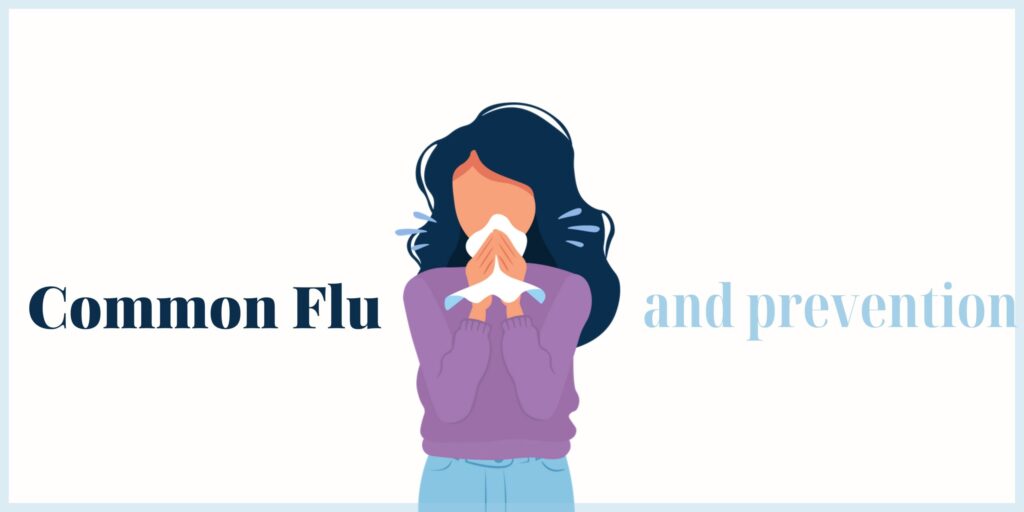Causes of flu
This post elaborates in depth on the causes of flu. The flu is a virus that affects your nose, throat, and lungs. Flu is a common name for “influenza,” but it is not the same as “stomach flu,” in which viruses make you sick to your stomach and make you throw up.
Most people get better on their own after getting the flu. But the flu and its complications can sometimes be fatal. People who are more likely to have problems with the flu are:
- individuals who are severely obese and have a BMI of 40 or higher.
- Individuals suffering from chronic illnesses such as diabetes, liver disease, kidney disease, heart disease, and asthma.
- People whose immune systems are weaker
- Pregnant ladies or women who have just given birth for up to two weeks since giving birth
- Inhabitants of long-term care facilities and nursing homes
- People older than age 65
- Kids under the age of five, in particular newborns under six months
Symptoms of flu
At first, the flu might look like a cold, with a runny nose, sneezing, and a sore throat. But colds tend to come on slowly, while the flu usually comes on quickly. And while a cold can be annoying, the flu usually makes you feel much worse. It might sometimes affect the lungs.
Infected people are the causes of flu. The virus tends to spread through the air in droplets when an infected person coughs, sneezes, or talks. Direct inhalation of the droplets is possible; you pick up the germs from a computer keyboard or phone and then put them in your mouth, nose, or eyes.
Some of the most common flu symptoms and signs are:
- Children experience diarrhoea and vomiting more frequently than adults do.
- Eye pain
- Fever
- Sore throat
- Sore muscles
- Stuffy or runny nose
- Sweats and chills
- Weakness and tiredness
- Headache
- Shortness of breath
- Persistent, dry cough
Most people with the flu can take care of themselves at home and rarely need to see a doctor. It is vital to receive prompt medical attention if you have flu-like symptoms and are at risk of serious complications. Taking antiviral drugs could shorten the length of your illness and keep you from getting sicker.
Risk factors
Several factors that could make you more likely to get the flu or its complications are:
People younger than 19 who have been taking aspirin for a long time and get the flu are more likely to get Reye’s syndrome. Native Americans may more likely get sick from the flu and have complications.
People who live or work in places like nursing homes or military barracks where a lot of people are more likely to get the flu. People who are in the hospital are also vulnerable to getting the flu.
A weak immune system is one of the causes of flu. People who have the virus are likely to spread it from a day before their symptoms start to five days after they start. Children and people whose immune systems aren’t as strong may be contagious for a bit longer.
The flu is usually not too bad if you are young and healthy. Even though you may feel terrible with the flu, it usually goes away in a week or two and doesn’t hurt you in the long run. But children and adults who are at high risk may have problems like:
- Acute respiratory distress syndrome
- Pneumonia
- Ear infections
- Bronchitis
- Heart problems
- Asthma flare-ups
Prevention
A flu shot may make you less likely to get the flu and make it less severe. It might make you less likely to get a serious flu illness that sends you to the hospital. The number of people who need to stay in the hospital could decrease if we could stop people from getting the flu and make flu symptoms less severe.
New variants of flu are one of the causes of flu. Influenza viruses are constantly changing, and every so often, new strains appear. If you’ve ever had flu, your body has already made antibodies to fight that strain of the virus. Suppose future flu viruses are similar to ones you’ve already been exposed to, either through illness or a vaccine. In that case, those antibodies may keep you from getting sick or make it less severe. But over time, antibody levels may go down.
Also, antibodies against old flu viruses might not protect you from new flu strains, which might be very different from the viruses you had before. Since the flu shot isn’t 100 percent effective, it’s essential to take other steps to stop the spread of the disease, such as:
- Stay away from crowds.
- Practise washing hands often with water and soap.
- If you cough or sneeze, cover them.
- Don’t touch your eyes, nose, or mouth.
- Clean surfaces that are frequently touched to stop the spread of disease.
A healthy way of life with preventive steps helps keep the body and mind healthy.



